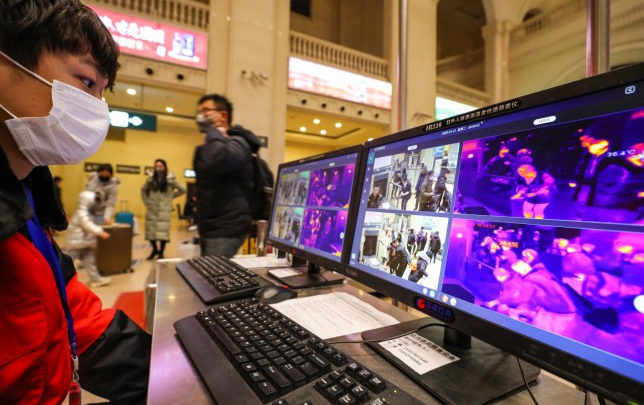
The deadly coronavirus which has already killed 17 people in China might already be in the UK, leading to the commencement of an isolation program for passengers flying into London from the Asian country.
The health threat level of coronavirus has been raised by UK health experts who likened it to the global Spanish Flu pandemic which killed over 50 million people in 1918.

Professor Neil Ferguson, an expert in mathematical biology at Imperial College London told newsmen today January 22 that 10,000 people could have already been infected by the new strain which is as deadly as the “Spanish flu epidemic”. He added that it is possible the UK might already have a victim of the deadly virus which humans have no immunity against.
Ferguson said;
‘There appear to be what are called “super-spreading” events which are events where one person can infect many others, which is similar to what we [saw] from the MERS and SARS coronaviruses.
‘Based on the numbers we’ve seen with onset dates up to 18th January we’ve updated our estimate of the number of cases in Wuhan to about 4,000 with an uncertainty range of 1,000 to 9,700.
‘All the reports I’ve read from within China, particularly Wuhan City but also other cities, [say] hospitals are now overwhelmed with suspect cases.
‘The authorities there are trying to scale up the response as fast as possible but it is an extremely demanding situation.
‘I think we will see a lot more information in the coming days and weeks and I suspect case numbers will continue to increase rapidly.’

UK’s Transport Secretary, Grant Shapps also announced a drastic measure to be taken to contain a possible case of the disease in the country. Speaking to newsmen at Heathrow Airport, he said;
‘We want to stay ahead of the issue so we are keeping a very close eye on it’.
Also speaking at a press conference today, Dr Nick Phin, Public Health England deputy director said;
“This is a new and rapidly evolving situation where information on cases and the virus is being gathered and assessed daily.
“Based on the available evidence, the current risk to the UK is considered low.
“We are working with the WHO and other international partners, have issued advice to the NHS and are keeping the situation under constant review.
“If you are traveling to Wuhan, you should maintain good hand, respiratory and personal hygiene and should avoid visiting animal and bird markets or people who are ill with respiratory symptoms.
“Individuals should seek medical attention if they develop respiratory symptoms within 14 days of visiting Wuhan, either in China or on their return to the UK.
“They should phone ahead before attending any health services and mention their recent travel to the city.”

It is expected that enhanced monitoring will be put in place for all direct flights from Wuhan to the UK, of which there are three each week that go straight into Heathrow. At an isolated area of Terminal 4 where each flight will land, the captain of the plane will tell passengers to tell a flight attendant if they feel unwell.
Though there are no plans to introduce blanket temperature screening of all passengers, it was however learnt that the information passengers give out will be passed on to public health teams at the airport who will meet the aircraft when it lands and carry out further checks.

The United States has also recorded its first case of the deadly illness which started in a market in Wuhan, China in December 2019. It was gathered that a patient who recently travelled to Wuhan was hospitalized in the United States last week for pneumonia.
There are also reported cases in Hong Kong, Taiwan, South Korea, Japan and Thailand. Scientists are currently working on a vaccine to stop the spread of the disease but it could be more than a year before it’s available.

The new coronavirus which is yet to be named causes cold-like symptoms including a runny nose, headache, cough, sore throat and a fever.
Chinese authorities confirmed 17 deaths today. The country’s National Health Commission said official cases soared by more than 100 in the last 24 hours, reaching 440.




